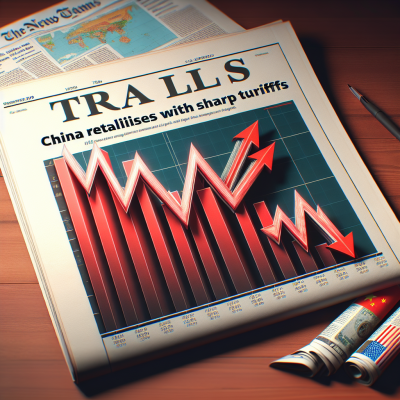
Markets React as China Hits Back with Harsh Tariffs
The escalation of the U.S.-China trade war took a sharp turn on Friday, triggering a market shake-up as China imposed fresh tariffs of up to 125% on key U.S. imports. In response, U.S. stock index futures dropped significantly, setting the stage for a turbulent trading day that hints at wider economic implications.
Wall Street Feels the Heat
Futures tied to the S&P 500, Dow Jones Industrial Average, and Nasdaq all slid in early trading, reflecting investor concern over the ramifications of the renewed trade hostilities. The heightened tariffs are expected to target U.S. goods including agricultural products, electronics, and automotive components—sectors already sensitive to economic shocks.
This steep tariff hike by Beijing is widely seen as retaliation to recent U.S. measures that increased restrictions on Chinese technology firms and imports. With both nations doubling down instead of moving toward reconciliation, investors fear that corporate profitability, particularly for multinational companies, could be jeopardized.
The Broader Impact on Global Trade
The move by China signals a significant deterioration in trade relations between the world’s two largest economies. Experts warn that this escalation will have ripple effects across global markets:
- Supply chain disruptions: Increased tariffs make U.S. exports to China more expensive, potentially forcing American companies to find alternative buyers or reduce output.
- Global inflationary pressure: Higher costs associated with tariffs could drive up consumer prices around the world.
- Investor uncertainty: As the trajectory of U.S.-China relations becomes murkier, businesses may delay investment and hiring decisions, fearing an unstable economic environment.
Economic Risks Loom on the Horizon
Economists and policy analysts are sounding the alarm about the potential for a broader economic downturn. Should the trade war persist or escalate, the likelihood of a global recession increases dramatically.
“What we’re witnessing is the start of a full-blown economic standoff,” said one analyst familiar with U.S.-China relations. “The longer this continues, the greater the risk for both economies—and the world.”
Markets are expected to remain volatile in the days ahead as traders await potential responses from Washington. Any signs of diplomatic overtures or retaliatory measures by the U.S. could move markets materially.
Investor Strategies in a Volatile Climate
Analysts recommend that investors tread carefully. With geopolitical risk rising, many are:
- Rebalancing portfolios toward defensive sectors like utilities, healthcare, and consumer staples.
- Increasing holdings in safe havens such as gold and Treasury bonds.
- Reducing exposure to export-heavy tech and manufacturing stocks until more clarity emerges.
Conclusion: Trade Row Could Alter Global Economic Outlook
The latest tariff escalation between China and the United States represents more than a simple trade disagreement—it reflects a fundamental shift in international economic policy. With both superpowers showing little sign of compromise, the global economy faces a period of intensified uncertainty.
Investors, businesses, and policymakers alike will be watching closely in the coming weeks for any developments. Meanwhile, market participants should brace for continued volatility as the U.S.-China standoff unfolds further.


Leave a Reply